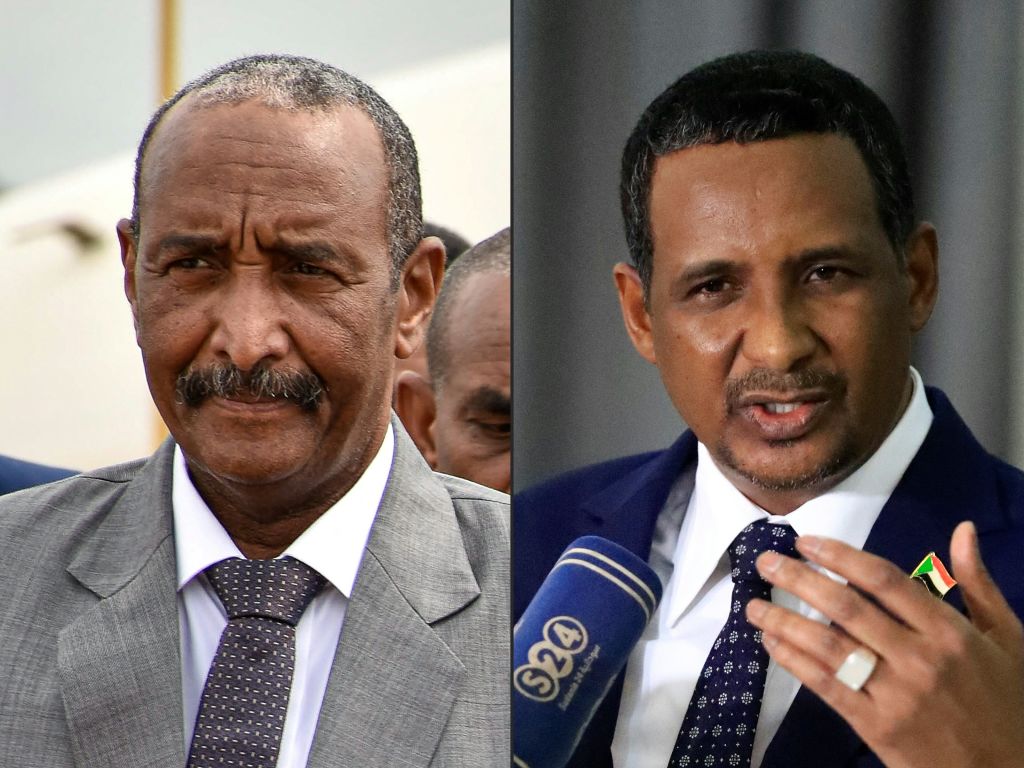ADF STAFF
When the head of Sudan’s Transitional Sovereignty Council removed his deputy, it was not a surprise. The two men are at war with each other in a conflict that is quickly tearing the country apart.
Lt. Gen. Abdel Fattah al-Burhan announced on May 19 that he was officially firing Mohamed Hamdan Dagalo, also known as Hemedti, as the head of the Rapid Support Forces (RSF). The two generals had an uncomfortable power-sharing agreement after the 2021 coup that ended a transitional government led by civilians and members of the military.
The two generals have one thing in common: a desire to gain personal wealth, with little apparent regard for good governance in their country. Beyond that, they are strikingly different.
Al-Burhan is a career soldier, about 62, who served al-Bashir for decades. He leads the country’s national military, the Sudanese Armed Forces (SAF), which is estimated to have 150,000 active personnel. They are fighting Hemedti’s RSF, believed to have about 100,000 fighters. Al-Burhan’s plan to consolidate the two forces this year was one of the factors that led the two sides to fight.
Al-Burhan has a formal military education, first studying at a military college in Sudan, then in Jordan and at a military academy in Egypt. Reuters reports that those who have met al-Burhan describe him as abrupt and quick-tempered, with an acute distaste for criticism. In April 2022, he threatened to expel the United Nations envoy, who had commented on the country’s political turmoil, accusing him of “lying, blatant lying.” In a November 2022 speech, al-Burhan declared, “We’ll cut out the tongue of anyone who speaks against the military.”
Hemedti means “Little Mohammed,” but al-Bashir called him “Himayti,” which means “my protector.” Hemedti is about 49 and has little formal education. Al-Jazeera has reported that he dropped out of school in the third grade and later became a camel trader. It is commonly reported that he was compelled to take up arms when men attacked his trade envoy, killing 60 members of his family and stealing his camels. He joined the Janjaweed, a militia made up mostly of camel-trading tribes, which operates in Darfur and parts of Chad.
Hemedti eventually caught the attention of al-Bashir, who was using Janjaweed fighters to attack people who were revolting against his rule in 2003 in Darfur. Janjaweed fighters were accused of murder, rape and torture.
The RSF, comprised of Janjaweed fighters, was established in 2013 with Hemedti as its leader. It was intended to augment the national armed forces and as a way for al-Bashir to protect himself from a military coup. Hemedti eventually became a favorite of al-Bashir. Promoted to lieutenant general, Hemedti was allowed to seize valuable gold mines in Darfur, giving him immense personal wealth.
“As he rose to prominence, Hemedti’s own business interests grew with help from Bashir, and his family expanded holdings in gold mining, livestock and infrastructure,” Adel Abdel Ghafar, director of the Foreign Policy and Security Program at the Middle East Council on Global Affairs, told Al-Jazeera.
His rival, al-Burhan, is believed to also have immense wealth. As commander of the SAF, he has access to an extensive business empire that controls companies ranging from construction to meat processing.
Compared to the national forces, the RSF troops are poorly trained and poorly equipped, and have traditionally operated as guerillas. In contrast, al-Burhan’s SAF has long-range artillery, fighter jets, tanks and heavy armor.
Cameron Hudson, an analyst at the Center for Strategic and International Studies, told Al-Jazeera that neither side is particularly suited for the current fighting in Khartoum.
“The SAF has an advantage there because the SAF knows Khartoum,” Hudson said. “At the same time, the SAF is not mobile; it cannot defend positions reasonably well and it is not going to be able to chase the RSF around the city.”
Still, neither force appears to be adjusting its combat tactics to its surroundings.
The RSF, Hudson noted, “uses the same tactics we know from the Janjaweed: they are pillaging, marauding, and looting in neighbourhoods.”

